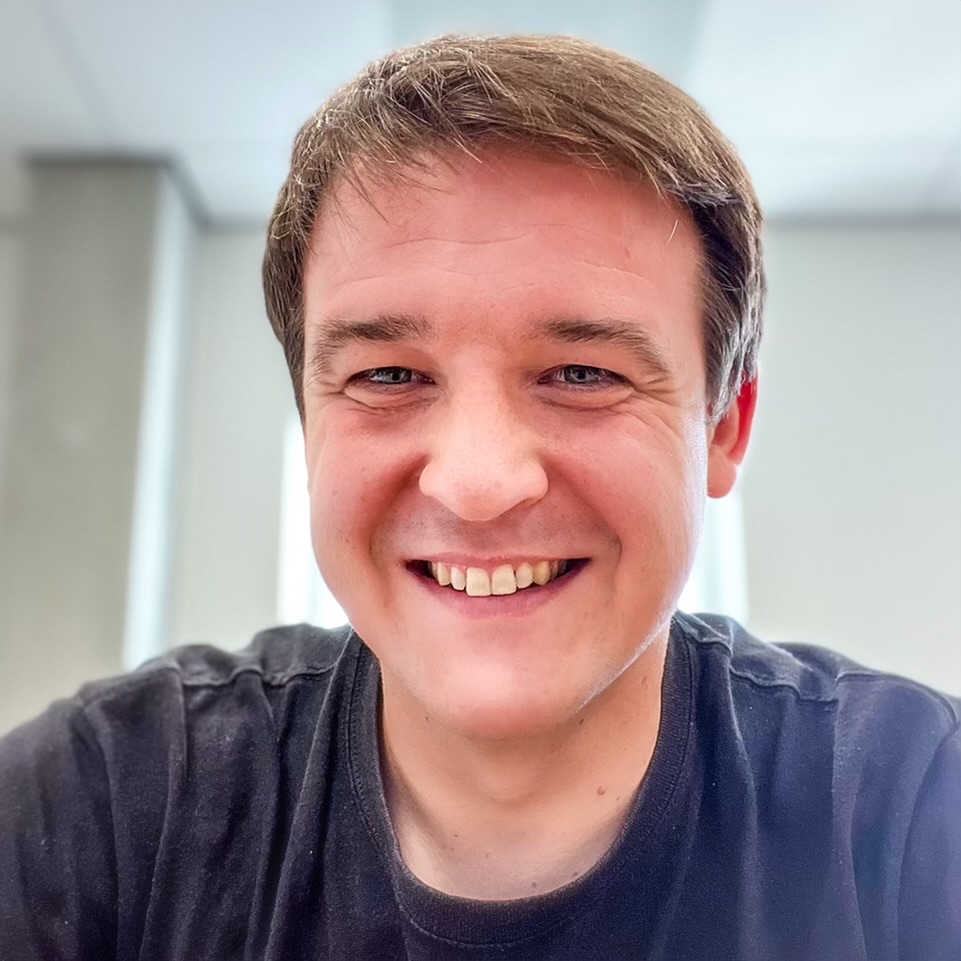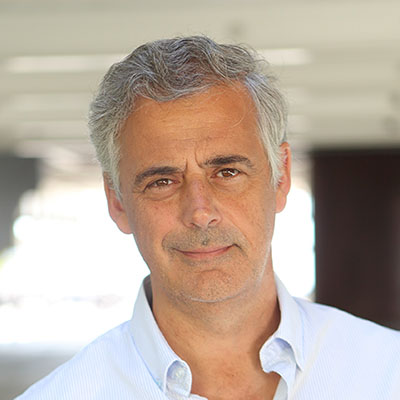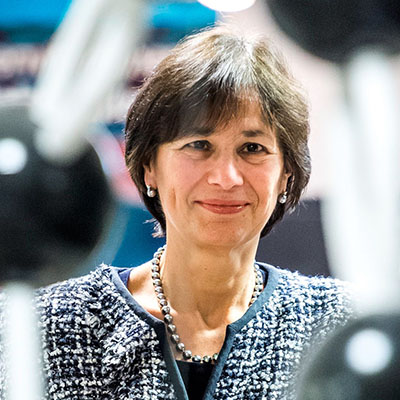27-29 May 2024
CCIB - International Barcelona Convention Center
Barcelona, Spain


27-29 May 2024
CCIB - International Barcelona Convention Center
Barcelona, Spain
The SLAS Europe 2024 Conference and Exhibition programme will feature important tracks focused on life sciences and their global impact. Check back soon for more programming information.
Special thanks to the SLAS Europe 2024 Program Chairs: Maciej Grajewski, Ph.D. (SG Papertronics) and Jordi Quintana, Ph.D. (Chemotargets).


Jordi Quintana, Ph.D.
Senior Project Manager
Chemotargets (Spain)


Maria Flocco, Ph.D.
AstraZeneca
Podium presentations will be organized into three educational tracks: Frontiers in Technology, Screening Applications & Diagnostics and Shaping the Future of Therapeutics. Track descriptions are listed below.
For a complete list of daily programming information and session titles, visit the Event Scheduler.
Frontiers in Technology
This track will feature presentations by renowned experts and innovators who are at the forefront of leveraging advanced technologies to significantly enhance laboratory screening, automation, and analysis. These technological advancements will be pivotal in driving scientific discovery forward. Moreover, the increasing volume of data generated from 'omics, high-content screening (HCS), drug discovery, and sample management has catalyzed the development of cutting-edge algorithms rooted in big data analytics and machine learning/artificial intelligence. Attendees can anticipate gaining valuable insights into the latest technological breakthroughs that have the potential to revolutionize their businesses and streamline their processes.
Co-chairs: Patricia Maguire (University College Dublin) and Mike Gray (GlaxoSmithKline)
Session 1: AI & Computation in Healthcare
Chair: Patricia Maguire, Ph.D. (University College Dublin - UCD Institute for Discovery)
Session description: In this session, we will address the latest advances of integrating analytics, AI and machine learning technologies in healthcare.
Session 2: Screening Approaches to Tackle Challenging Targets
Chair: Melanie Leveridge (AstraZeneca)
Session description: Genetic and genomics driven target identification is uncovering increasingly novel targets, and target classes, which cannot be tackled using conventional screening methods. This session explores the approaches being employed to identify tools and lead molecules against such targets, for example screening for covalent molecules, application of in cell target engagement assays and assays to identify ligands targeting RNA.
Session 3: Cellular Technologies
Chair: Lorna Suckling, Ph.D. (GSK)
Session description: This session will explore advances in technology for cellular screening.
Session 4: Sample Management Technology
Chair: Karin Kaspersson, MSc (AstraZeneca)
Session description: This session will explore new or existing Sample Management technologies or processes which push the boundaries of Sample Management, enable the boundaries of screening to be pushed and generally enable the production of big data.
Screening Applications & Diagnostics
This track aims to provide a clear view on how diagnostics and screening applications are evolving by taking into the account the medical and scientific challenges arising in the post-Covid era. This track will host renowned experts and innovators who will guide us through the latest technologies and breakthroughs that are influencing emerging topics. Topics will include new testing paradigms which are closer to patients (point-of-care or at-home testing), new automation technologies, sequencing of the human genome, and how AI and machine learning can help address global emerging threats such as anti-microbial resistance, antibiotic massive abuse, and sepsis management. Attendees can expect unique insights and hints on the latest technological innovations, while our presenters will shed more light on key trends that we should look for in the coming years.
Co-chairs: Ricard Martin (Qiagen) and Dominik Rubus (Rabus.Tech)
Session 1: The New Automation, Decentralization and Point of Care
Chair: Ricard Martin, MBA (QIAGEN)
Session description: New challenges and benefits are arising from the new diagnostics and screening paradigm: on one hand, screening and diagnostics are moving closer to patients in the so-called point-of-care, or even home-testing. On the other hand, there are still many determinations that require better automation, efficiencies and new technologies to be tested in the Central lab. In this round table including industry experts and clinicians, we will assess the impact of moving diagnostics closer to patients and review the newest technologies in this field, whilst understanding what part of testing needs to be kept in the Central lab, and which cutting-edge technologies provide more efficient, smart and automated tools.
Session 2: The next big pandemic: Sepsis and Antibiotic Resistance Management: An Increasing Need for Better Screening and Diagnostics
Chair: Enrique Hernandez Jimenez, Ph.D. (Loop Diagnostics)
Session description: Blood cultures have been the staple of screening and diagnostics laboratories for well over half a century, but gaps remain in our ability to identify the causative agent in patients presenting with signs and symptoms of one of the major common and unresolved causes of death: Sepsis. Moreover, the inability to accurately diagnose the exact pathogen causing an infection often leads to broad-spectrum or inappropriate antibiotic prescribing. This adds unnecessary cost and promotes the development of antibiotic resistance, one of the biggest threats for the whole human population during the next decades. In this session, we will tackle how new molecular technologies fueled with Machine learning and AI can help overcome these challenges in the near future.
Session 3: AI, Machine Learning and Big Data on the Rise for Screening and Diagnostics
Chair: Steve Shih, Ph.D. (Concordia University)
Session description: In the next few years, AI is likely to automate a good deal of health administration, relieving workers of mundane tasks, saving both money and time, and thereby improving clinical outcomes. This sort of AI will integrate with different parts of the system, for example the payers and providers, much more tightly. It is also expected that AI will profoundly affect biopharma industry. In this session, we will cover how AI already is doing this and examine, in the long term, how AI, Machine learning and Big Data will change the relationship between clinicians and patients as diagnostics become increasingly automated.
Session 4: The Sequencing Revolution
Chair: Jessica Nordlund, Ph.D. (Uppsala University)
Session description: There is a revolution occurring in medical diagnostics created by the understanding of the human genome combined with Next Generation Sequencing technologies. DNA sequencing is the process of determining the precise order of nucleotides within a DNA molecule, the genetic code. In this session, we will review the latest technologies in screening and diagnostics that will help revolutionize the next generation of screening and diagnostics by facilitating and socializing the sequencing of the human genome.
Shaping the Future of Therapeutics
This track aims to provide a better understanding of current approaches that significantly impact the journey of novel medicines from scientific discoveries to patient treatment. Over four sessions, you will explore how the combination of big data and artificial intelligence is transforming the traditional drug discovery process. Additionally, we will delve into how personalized medicine and drug repurposing influence patient outcomes. We'll discuss the future of safety, toxicology and efficacy studies in light of the FDA's recent decision to eliminate the requirement for animal testing. Finally, we will present the advantages and challenges in the discovery and delivery of oligo therapeutics.
Co-chairs: Magdalena Otrocka (Ardigen) and Annika Jenmalm Jensen (Karolinska Institutet)
Session 1: Oligo Therapeutics and Delivery
Chair: Joanna Rejman, Ph.D. (AstraZeneca)
Session description: The recent success of Covid-19 vaccines has unraveled the pharmaceutical potential of both mRNA and non-viral delivery systems. Transforming a formulated mRNA into an effective drug has been a tremendous effort. These achievements should further facilitate the development of therapies based on the same technology. This session will focus on the recent advances in the field, and it will highlight existing challenges and potential solutions to those.
Session 2: Data/AI Driven Drug Discovery
Chair: Jordi Carreras-Puigvert (Uppsala University)
Session description: This session centres on the transformative impact of data science and artificial intelligence (AI) in drug discovery. The focus will be on the application of machine learning, data analytics, and computational models for tasks such as identifying novel drug targets and optimizing lead compounds. Sessions will address the journey from data acquisition to actionable insights, emphasizing the development of robust algorithms and the validation of AI models.
Session 3: Future for Assessment of Drug Safety, Toxicology and Efficacy
Chair: David Baker, Ph.D. (AstraZeneca)
Session description: This session will look at the ways in which state-of-the-art in vitro systems can reduce the need for animal data in drug discovery and enhance the translational relevance of the early drug discovery process.
Session 4: Precision medicine and drug repositioning
Chair: Krister Wennerberg, Ph.D. (University of Copenhagen)
Session description: In this session, we will explore how personalized medicine and drug repositioning enhance drug discovery pipeline productivity. We'll discuss the current research status in these areas, covering techniques and challenges.
The Editors of SLAS Discovery and SLAS Technology have hand-selected a list of pre-reads to give SLAS Europe 2024 attendees a glimpse of the research represented within each educational track of this year's program.
Make time to attend a Topical Interest Group (TIG) meeting. Learn more about the latest findings, best practices and challenges facing your particular professional area, or just meet new colleagues in your particular field.
This year, four TIGs will meet: